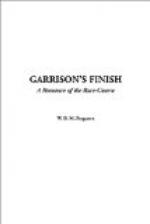On the other hand, if Crimmins had lied—Garrison’s jaw came out and his eyes snapped. Then he would scrape himself morally clean, and fight and fight for honorable recognition from the world. He would prove that a “has-been” can come back. He would brand the negative as a lie. And then—Sue. Perhaps—perhaps.
Those were the two roads. Which would he traverse? Whichever it was, though his heart, his entire being, lay with the latter, he would follow the pointing finger of honor; follow it to the end, no matter what it might cost, or where it might lead. Love had restored to him the appreciation of man’s birthright; the birthright without which nothing is won in this world or the next. He had gained self-respect. At present it was but the thought. He would fight to make it reality; fight to keep it.
And that night as the train was leaping out of the darkness toward the lights of the great city, racing toward its haven, rushing like a falling comet, some one blundered. The world called it a disaster; the official statement, an accident, an open switch; the press called it an outrage. Pessimism called it fate—stern mother of the unsavory. Optimism called it Providence. At all events, the train jammed shut like a closing telescope. Undiluted Hades was very prevalent for over an hour. There were groans, screams, prayers—all the jargon of those about to precipitately return from whence they came. It was not a pleasant scene. Ghouls were there. But mercy, charity, and great courage were also there. And Garrison was there.
Fate, the unsavory, had been with him. He had been thrown clear at the first crash; thrown through his sleeping-berth window. Physically he was not very presentable. But he fought a good fight against the flames and the general chaos.
One of the forward cars was a caldron of flame. A baby’s cry swung out from among the roar and smart of the living hell. There was a frantic father and a demented mother. Both had to be thrown and pounded into submission; held by sheer weight and muscle.
There were brave men there that night, but there was no sense in giving two lives for one. Death was reaping more than enough. They would try to save the “kid,” but it looked hopeless. Was it a girl? Yes, and an only child? She must be pinned under a seat. The fire would be about opening up on her. Sure—sure they would see what could be done. Anyway, the roof was due to smash down. But they’d see. But there were lots of others who needed a hand; others who were not pinned under seats with the flames hungry for them.
But Garrison had swung on to a near-by horse-cart, jammed into rubber boots, coats, and helmet, tying a wet towel over nose and mouth. And as some stared, some cursed, and some cheered feebly, he smashed his way through the smother of flame to the choking screams of the child.




